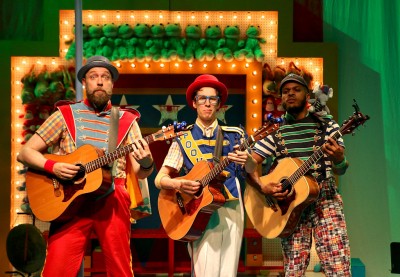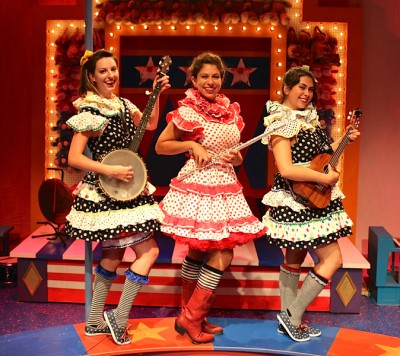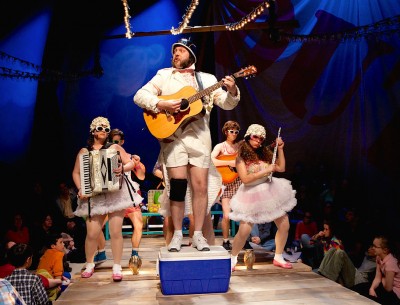Tina Muñoz-Pandya grew up in Silver Spring.
Steeped in the arts, she went to summer camp at Round House Theatre, played the cello at Blair High School, and visited the Kennedy Center and the Music Center at Strathmore en famille.
“I was always interested in music,” she recalled. “My parents were really big on taking us to the symphony, and my mom was in the National Philharmonic choir.”
High school for Muñoz-Pandya was all about musical theater. She played a pirate in “Pirates of Penzance” freshman year, and starred as Yum-Yum in “The Mikado” senior year.
“Perfect bookends,” is how she described the trajectory of her roles in operettas by the Victorian era theater impresarios Gilbert & Sullivan, but there’s a bit more to it than that.
Because after high school—and after a degree in drama and women’s studies from the University of Michigan, a stint at the School at Steppenwolf, a year traveling with Olney Theatre Center’s renowned National Players, and an induction into the Chicago-based theater company The Hypocrites—Muñoz-Pandya is back in Montgomery County. She’s performing in “The Mikado” and “The Pirates of Penzance.” And she’s part of this hot, hot summer’s hottest ticket.
Band Raid

“We’re definitely presenting it in a different way,” said Sean Graney, the artistic director of The Hypocrites, when asked about the method behind the madness that is this wildly popular version of Gilbert & Sullivan. “We have no orchestra: Everybody in the cast plays their own instruments, mostly strings. There’s a banjo, a guitar, a ukulele and an accordion, a flute. We had to figure out how to reduce these beautiful, complicated operettas by Gilbert & Sullivan to a 10-piece band of people walking around.”
According to Graney, it was a matter of isolating the vocal melody, figuring out the chord system, and going back to the original score to make sure nothing was lost or left behind. That his cast is outrageously talented helps, of course, but while Graney has nothing but love for his marvelous, musical Hypocrites troupe, he is quick to praise Gilbert & Sullivan as well.
“They’re not recognized for their brilliance as commonly as they should be,” he said. “The roots of both these pieces are that we should all open up to love, be respectful and get along with each other. There are lessons wrapped up in this beautiful music, this funny, funny book—it’s just a testament to how brilliant Gilbert & Sullivan are.”
What they were—librettist W. S. Gilbert and composer Arthur Sullivan—shouldn’t be difficult for modern audiences to understand. Together they created 14 comic operas in the late 19th century, with “The Mikado,” “The Pirates of Penzance” and “H.M.S. Pinafore” among the best known today.
Also well-known today: Gilbert & Sullivan were not the most progressive thinkers on the planet.
“They’re considered elitist, ‘white,’” noted Graney. “People either dismiss them as frivolous and unimportant, or they point out that “The Mikado” as written is a horribly racist piece of theater.
“That has to be addressed.”
Tweaks and Greeks

For Graney, the show’s adaptor, that means keeping the music, the story, the fun—and tweaking the books in a thoughtful way that removes or changes any references that are unacceptable by modern audiences, regardless of the enthusiasm the Victorians may have had for racism, misogyny and xenophobia.
Muñoz-Pandya is delighted with the result.
“We’re making fun, but it’s not at anybody’s expense,” she noted. “As an actor of color and a woman, it’s really great to be part of a diverse cast, and to be in a show that lets us be who we are and to laugh at ourselves.”
Laughter is key to these productions—the talented young cast brings the comedy, Chicago-style—and the deeply incorporated musical threads pull it all together.
“I definitely think some plays would benefit from being ‘lost,’ but not these,” Graney said. “The music is so brilliant, and it’s not that hard to remove the parts that don’t work. You have to be ready to listen to anybody with a different perspective—or a perspective you haven’t heard yet.
“To listen, to appreciate, to hear their voice and to be better.”
And this is where Graney excels. The Boston native headed to Chicago after graduating from Emerson College two decades ago, and there, he created The Hypocrites in 1997.
What’s in a name? Graney says that our English word ‘hypocrite’ is actually the ancient Greek word for an actor, someone who speaks and acts like someone they’re not. The playwright-director takes his Greek seriously, too; not long ago, he absented himself from the group he’d founded to create “All Our Tragic,” a 12-hour rendering of all 32 surviving Greek tragedies. It was theater like it ought to be for Graney, who points out that for the Greeks, going to a show was a hyper-social, interactive experience that lasted a long time and often opened and elevated the minds of theatergoers.
An improbable segue to Gilbert & Sullivan, perhaps, but Graney does like a challenge.
Pre-Prom Party

The secret to the success of The Hypocrites’ run at Olney Theatre Center—the special sauce, if you will—is that the troupe performs in the middle of the audience. Promenade seating allows audience members to literally sit on the set, fading into the action, moving when the performers silently ask them to with a tap or a pointing finger, and causing tiny explosions of hilarity with an ad libbing actor.
Not everyone needs to participate; there are traditional seats in the black box for more reticent theatergoers. Still, to get to the talented actors performing the beautiful music, embodying the quirky characters, and breathing fresh, funny life into these ancient Victorian scripts, audience members need to go all in. There’s an infectious joy that allows the troupe to encourage engagement even from the stodgiest seats, so that every member of the audience becomes part of the play.
Graney said promenade “creates a micro-society in the theater.
“People bump up against each other,” he explained. “They share smiles and private jokes. They help children off of platforms.
“The goal is that everyone becomes active, generous members of society for the time they’re in the theater.”
Not for 12 hours—this isn’t “All Our Tragic,” after all—but for as long as they like. Theatergoers are invited to arrive early to the show so they can sing, dance and bat around a beach ball as they get to know the performers and each other. It’s exactly the social construct Graney is looking for—and it’s something that has audiences talking, if sold-out shows are anything to go by.
“It’s always fun to watch the audience come in,” said Muñoz-Pandya. “Some are excited. Some are like, ‘What have I walked into?’
“But everyone’s been sweet and funny. Even the Gilbert & Sullivan purists.”
The Hypocrites’ productions of “The Mikado” and “The Pirates of Penzance” run in rotation through Aug. 21 at Olney Theatre Center for the Arts, 2001 Olney-Sandy Spring Road, Olney. Tickets range from $25 to $65. Call 301-924-3400 or visit www.olneytheatre.org.